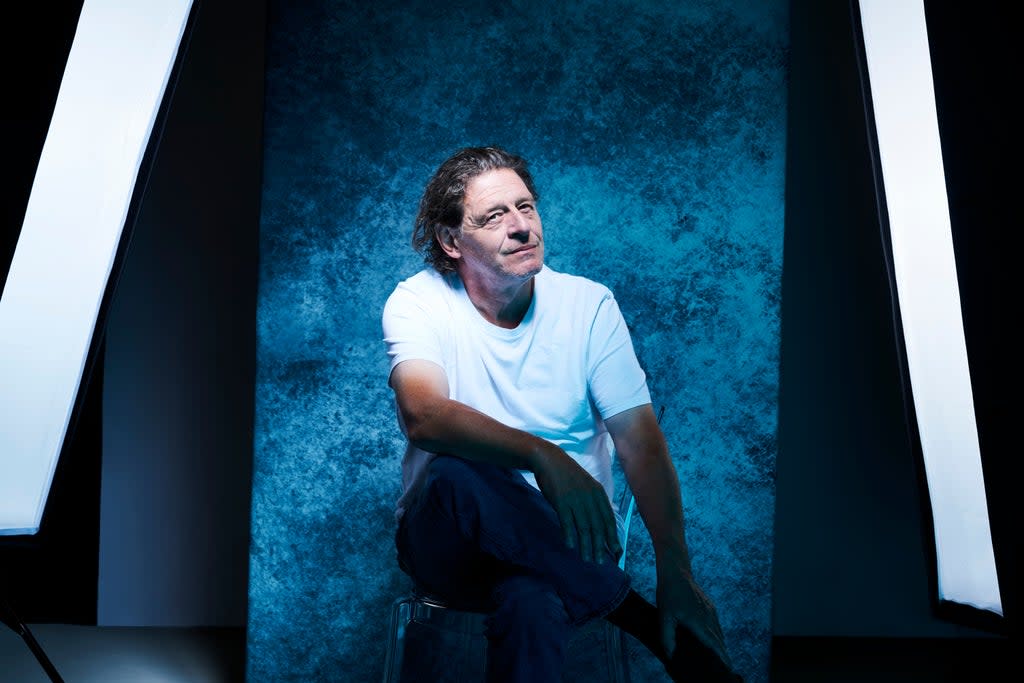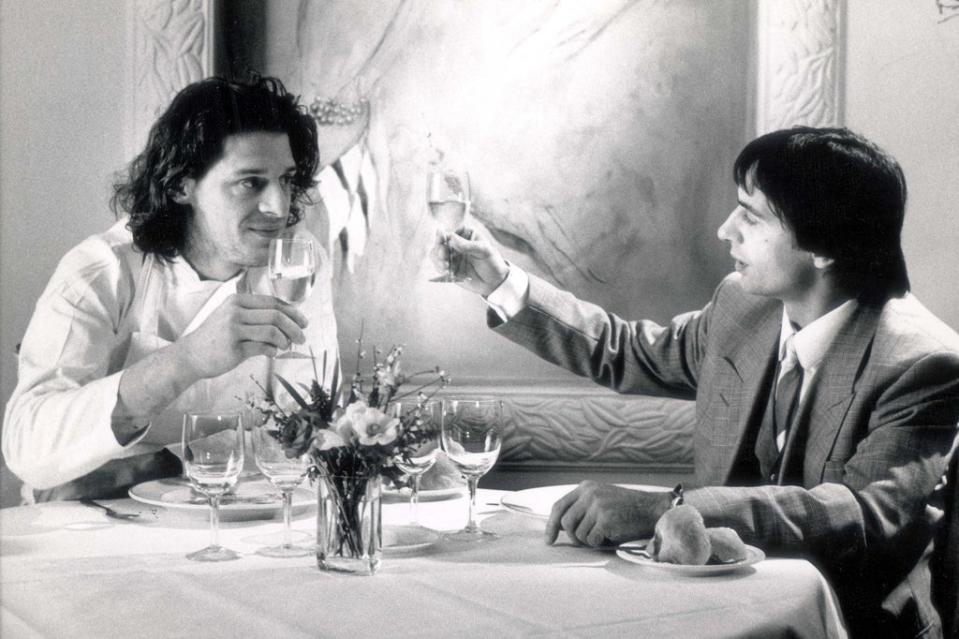Marco Pierre White interview: I used to be fuelled by fear — now it’s family

Marco Pierre White is back. Perhaps not in the way that might keep the publicist behind his new four-storey restaurant entirely happy, but the old fire is there. The 59-year old chef seems every inch of his outsized reputation, barking “yes?” after every few words to ensure I’m keeping up, before letting out (the occasional) hearty, cigarette-stained laugh.
On November 1, the chef will open his first restaurant in the West End in more than a decade. With its offering of steaks, chops, gin cocktails and, er, pizzas, Mr White’s will not, it feels fair to say, be chasing the three Michelin-starred perfection that made White’s name when he became the first British chef ever to win them. And I’m not even sure he’s terribly interested in plugging the place. “To give an interview just to promote something is wrong,” he says with a slight scrunch of the nose.
Oh go on, I say, play ball. He pauses — White always pauses, though he never ums or ers — “Lockdown has presented opportunities which, before lockdown, we would never have had.”
Well, this opportunity is 14,500 square feet, seats 500, and is slap-bang in the middle of Leicester Square. Will it be a challenge? A curled smile; a fixed stare. “Restaurants are very easy. It’s a front room with a kitchen, and maybe a bar.” But why just the one in the city’s tourist trap? “I’d rather have one big one than 20 small ones — this way, you’re dealing with one chef, one manager.”
Will it be any good? “We bring in food at a standard, at a price point. I think what’s important is to make everything affordable; I like when I can walk into restaurants and every sector of society is in them. I think it should be democratic, that’s very important for me.”

Very noble, Mr White. He says he wants groups of regulars coming into town to celebrate their birthdays and anniversaries, and adds that steaks will be about £18, pizzas a tenner. Not quite the price of the infamous £25 chips — he was humbling a show-off City boy who’d asked for the (off-menu) dish and was charged accordingly — and not quite with the finesse of his old signature tagliatelle of oysters with caviar.
“Pizza is quick, it’s easy, and if you’re a tourist? We all love a pizza. And it takes 90 seconds to cook it.” He estimates that the new place might end up plating “two or three thousand meals” a day, and that few dishes can be as consistent as a pizza. Still, some old standards die hard. “I don’t like all those strange peculiar pizzas. If you ask me if I like pineapple on my pizza — no, I don’t.”
He’s developed the menu with his two executive head chefs, which is, he says, waving the idea away with his hand, the way he works with Black and White Restaurants, the group who look after the 34 MPW-branded restaurants that operate across the UK. “Nick [Taplin, the group’s chief executive] is my friend, he’s the genius who runs the empire.” It doesn’t sound like London’s really getting the full Marco.
So why do this? White rarely breaks gaze, but he has a trick. It is a blink of acknowledgement, as though to assure you that, yes, he hears the subtext.
He blinks now. “Security for my children. It’s as simple as that. You can’t fall in love with everything you do. If I think over the years, I’ve had a love affair with three establishments: Harveys, [celebrity haunt] Mirabelle, and now what we’re building in the country with my daughter.”
I may have been very naughty but a lot of young men are naughty. It’s part of growing up.
And, here, suddenly we’re off. Sure, maybe Leicester Square is just about the cash, but there’s something else to be excited for: a new love affair. Family drives Marco. The project in the country is a hotel, the Rudloe Arms, and both the pandemic and the increased involvement of his daughter Mirabelle — one of his four children — seems to have revived his interest in the place. He speaks of overhauling the gardens, turning some of the grounds into wetlands, planting an orchard and re-thatching roofs. He “really enjoyed” the pandemic, in fact, as “I did more gardening than I’ve ever done in my life before.” He adds that he’s working with Mirabelle “every day”.
His children come up time and again in our chat: “Luciano is building his own restaurant,” he says of his eldest son, while Marco Jr, his second son, a former Celebrity Big Brother contestant, is indulged. “Marco is… slowly discovering himself. They’re three very different children but I still have a great responsibility and a duty; that’s why I work, to set an example.”
Besides, you sense, Marco Jr’s bad behaviour, including having sex live on TV and appearing in court on allegations of theft, mightn’t bother the man once continuously dubbed the “enfant terrible” of UK restaurants. “I may have been very naughty but a lot of young men are naughty. It’s part of growing up.”

Just as his work influences his fatherhood, White’s own childhood shaped his drive to succeed. White was the third of four sons, raised in what he calls a working-class household in Leeds, to a chef father and an Italian mother which, he says, “was quite hard. Because remember it was just 16 years after the Second World War; I’d walk into shops and they wouldn’t ignore her, but they’d sort of blank her.”
Witnessing his mother’s death from a brain haemorrhage profoundly affected him, both for its horror and for the way it moved the relationship with his father. “I think my mother’s death played a role in my work ethic; I was six. And I think back to her death, and then and never being good enough in the eyes of my father… If I played football for the football team, if I didn’t score, he’d be disappointed in me. So if you look back, I suppose what motivated me was acceptance.”
My mother’s death played a role in my work ethic… and never being good enough in the eyes of my father
Certainly, you sense, acceptance played a big part in the way White worked. His most famous training came under Albert and Michel Roux at Le Gavroche, and with public feuds long forgotten — at White’s second wedding (he’s had three), Albert was best man, but the pair fell out when the Frenchman apparently dubbed him “bad for cooking” — he speaks of both fondly. “Watching Albert in the kitchen was like seeing Cantona play,” he smiles, “What they did is something very few chefs ever achieve — they created a movement, not a following.”
Still, for all the wistful stories of plucking grouse as he and Albert shared a Benson & Hedges, White admits that, through much of his early training, “I was fuelled by fear. I was f***ing terrified.” In the late Seventies, cooking was a “working-class profession, where boys went to learn their trade. It was a tough job for tough men.” Still, he credits the gruelling shifts of snarled insults as the grounding for his success. “At the Hotel St George, the chef there was the hardest bastard ever. Forget all the others; he’s the reason I eventually got three stars.”
I bring up claims of abuse and humiliation made against another well-known chef. Given that the dangers posed by hard working conditions have lately dogged the hospitality industry, does he think such means justify the ends? “I don’t know about that,” says White, “It’s very wrong to try and draw me into something I don’t know anything about.”
He brushes aside concerns over long hours and overtime — “You get paid overtime, so how can that be classed as abuse?” — but becomes thoughtful when I mention chefs being punished by having their hands held on hot pans, and tells me he was burnt with a fish knife while working at Box Tree. Was that wrong? “I don’t think it was right. I was quite upset but I said nothing and I didn’t complain.”
Was it these sorts of incidents that led him two years ago to tell the Irish Independent that “men… absorb the pressure of the kitchen better”, I wonder? “Look,” he says, suddenly unsettlingly quiet, “It was taken out of context. If you look at the whole quote, I actually say women are better cooks, don’t I? I didn’t say they struggle. I said women have got a better sense of smell, and a better palate, and they’re more consistent and they’re tidier and cleaner. Did you not read it?
“Kitchens at that level are pressure cookers. But I don’t know what goes on at this level anymore. That was me giving my insight into the world I came into, 45, 40, 35 years ago. It was a very different world then than it is today.”

It seems unlikely that someone still regularly in contact with so many leading chefs can really have so little idea of what today’s kitchens are like. He speaks warmly about Raymond Blanc and Phil Howard, and insists he hasn’t had a falling out with Gordon Ramsay “in 25 years”. As evidence, his old Nokia phone is produced, showing the two are in touch. That morning, a photo of White at Ramsay’s Street Burger appears on Gordon’s Instagram, with the hashtag #broughtateartomyeye. Still, when I idly ponder that Ramsay may be the only truly globally-famous chef, White is quick to tell me he’s “out of the country for eight or nine months of the year... for work. I never go on holiday”.
So a touch of the old competitiveness is there, then, but the anger is long gone. There’s been no therapy, he says (“I believe in self-analysis”). White is entertaining to the last, with a rather joyful flippancy — I wonder if he has been to any of London’s current three stars and am met with a furrowing of the eyebrows: “No. Why? I’ve no interest”. But when he’s talking about his family, about working now on Rudloe, he is as animated as anything. There’s the place to go. We’re back on Mr White’s, briefly: does he consider himself, these days, a restaurateur? Chef? Businessman? Franchisee? “I’m none of those, I’m Marco. It’s as simple as that, isn’t it?” Perhaps. But he’s clearly very much, these days at least, happiest as Dad.
Mr White’s opens on November 1 at 20-21 Leicester Square, WC2H 7LH; mpwrestaurants.co.uk
Read More

 Yahoo News
Yahoo News 
